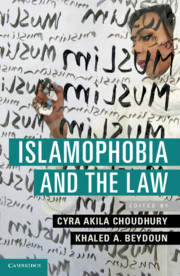Book contents
- Islamophobia and the Law
- Islamophobia and the Law
- Copyright page
- Contents
- Note on Contributors
- Acknowledgments
- Introduction
- Part I Race and Citizenship
- Part II The Politics of Islamophobia in the Courts
- 5 The Lost Story of Iqbal
- 6 “Muslim Bans” and the (Re)making of Political Islamophobia
- 7 “Islamic Law” in US Courts: Judicial Jihad or Constitutional Imperative?
- Part III Islamophobia in Criminal Law and National Security Law
- Part IV Law, Society, and Islamophobia
- Index
5 - The Lost Story of Iqbal
from Part II - The Politics of Islamophobia in the Courts
Published online by Cambridge University Press: 29 September 2020
- Islamophobia and the Law
- Islamophobia and the Law
- Copyright page
- Contents
- Note on Contributors
- Acknowledgments
- Introduction
- Part I Race and Citizenship
- Part II The Politics of Islamophobia in the Courts
- 5 The Lost Story of Iqbal
- 6 “Muslim Bans” and the (Re)making of Political Islamophobia
- 7 “Islamic Law” in US Courts: Judicial Jihad or Constitutional Imperative?
- Part III Islamophobia in Criminal Law and National Security Law
- Part IV Law, Society, and Islamophobia
- Index
Summary
Every first-year law student reads Ashcroft v. Iqbal,1 the 2009 Supreme Court decision that transformed pleading standards across civil litigation. Now an established part of the civil procedure canon, the 5–4 decision significantly eased the standard for dismissing complaints for failure to state a claim, upending the liberal pleading regime that had marked federal litigation for half a century. The old standard judged the factual sufficiency of complaints only according to whether they gave defendants fair notice of the basis for the plaintiff’s case, rather than screening cases on their merits.2 Iqbal required instead that a plaintiff set out facts to persuade a judge that her claim was “plausible.” The new pleading standard attracted enormous attention from lawyers, legal scholars, and lower courts. Indeed, by 2015, the decision had already become one of the five most cited Supreme Court decisions of all time.3
- Type
- Chapter
- Information
- Islamophobia and the Law , pp. 95 - 112Publisher: Cambridge University PressPrint publication year: 2020
- 1
- Cited by



